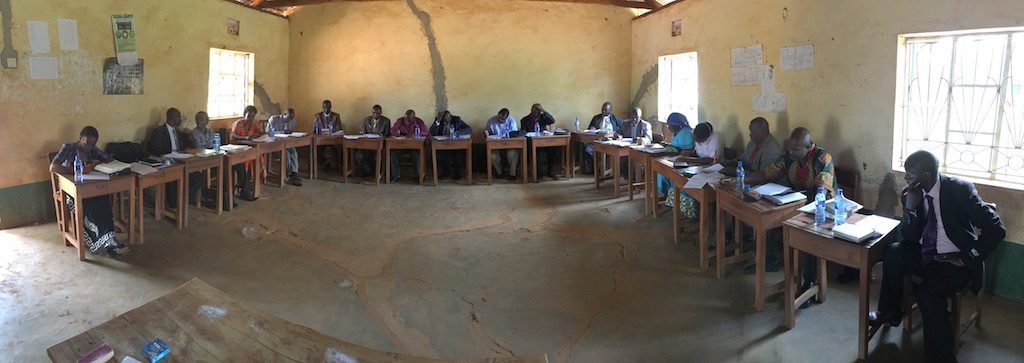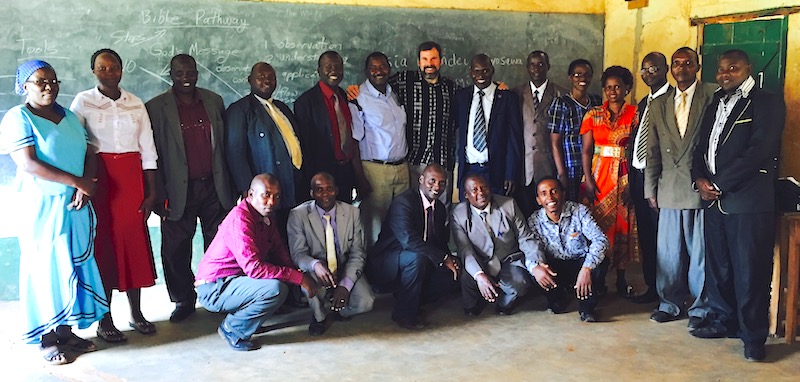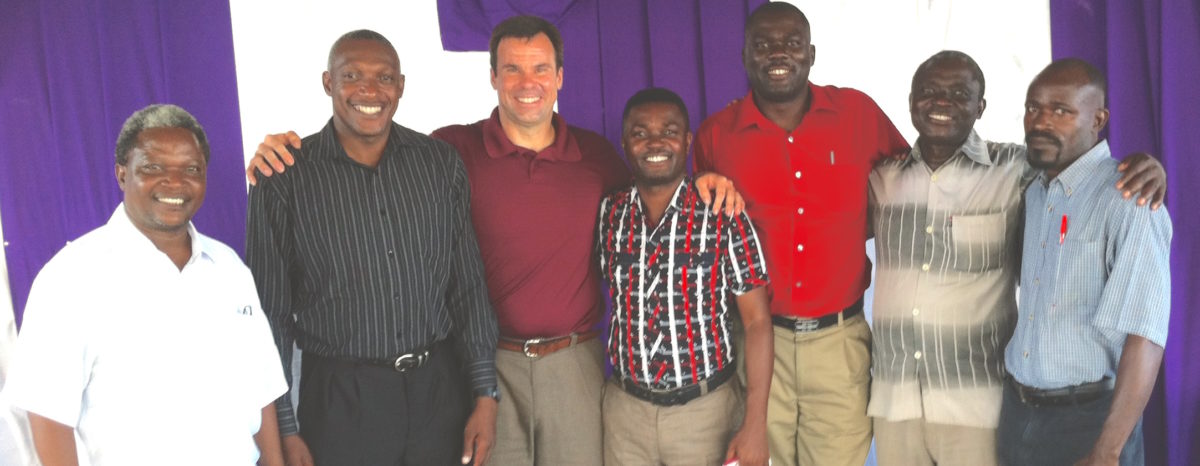In just a few days I leave for two African countries I’ve not visited before: Ghana and Togo. I’m looking forward to making connections and preparing to launch a new Pathways network here.
But the focus of this blog will be on responses to questions asked of a certain group of Kenyan pastors. The responses were quite informative, and helped to shape some of the research for a paper I just completed on oral learning African pastors changing to becoming literary learners through the tool of our Pathways Bible training. I’ll share some of the results of the survey here to give you a glimpse into the lives of this particular group of pastors.

While in Kenya on my most recent trip, I conducted surveys and interviews with 20 AIC (Africa Inland Church) pastors from the Kamba tribe in the Nzaui region who will be participating in our Pathways training. The group was a bit unusual from those in Africa we often work with in that they were all from the same tribe, church affiliation and region. The average education level (formal Bible training) was much higher in this group than normal, with all but one responder having at least received a four-year Bible degree or diploma. When I asked interviewees how they determine what to preach to their people, three equally common answers were: pray to God for a message, look at the needs in my church, and choose a book/passage in the Bible to preach through. In terms of the process the pastors go through in preparing a sermon, nearly all of them mentioned some combination of prayer and reading/studying the Bible. Here are some of the other results:
- How much time do you usually spend preparing a Sunday sermon? (Circle one)
0-5 hours 6-10 hours 11-15 hours 15+ hours. 5 8 3 4
What percentage of this is spent studying the text of the Bible?
0-10% 10-25% 25-50% 50-75% 75+% 0 1 5 12 2
- What percentage of the people in your churches are able to read?
0-10% 10-25% 25-50% 50-75% 75+% 1 1 4 10 4
What percentage have Bibles?
0-10% 10-25% 25-50% 50-75% 75+% 4 6 8 2 0
What percentage use them when you are preaching?
0-10% 10-25% 25-50% 50-75% 75+ 3 10 5 2 0
- How would you describe your preferred learning style (circle one letter):
- I prefer to watch others and repeat what I see them doing (in person, TV, video). =1
- I prefer to study written words (books, papers) and learn from what I read. =7
- I prefer to hear instructions or a message and learn by what I hear. =1
- I prefer to do my own thinking and test my decisions, learning by trial and error. =3
- I prefer to trust in the Lord and not use any of these methods. =8
- Some other method of learning. Please explain: =0
From these results, we can discern that this fairly academically-oriented group live out their values by spending the majority of their sermon prep time in the Bible. However, the majority of people in their churches neither have Bibles nor use them in a Sunday service, indicating they are not literary learners. It appears that the pastors’ learning styles are split between literary learning and using some unknown “spiritual” method of learning. However, I wonder if this question may not yield accurate results due to the fact that the participants would need to know the definitions of various learning styles listed in the interview and would need to have the self-awareness to know which style they prefer.
In order to learn which preachers are influencing interviewees (i.e. change agents, etc.) and thus what study patterns the interviewees may be following in their sermon preparation and delivery, I asked a series of questions related to these issues to determine a model learning method. In answer to the question who their favorite preacher is, the top answer was Rev. Timothy Mwangangi, a local preacher in the AIC DCC. Only two noted someone who is not African, but is widely known. When asked why they like him, the answers varied, but common themes were that their communication is clear, biblical (largest percentage), creative, easy to understand and applicable. When asked how you would describe your preferred preacher’s style of preaching, 18 out of the 20 interviewees responded that “he preaches through a Bible series using passage after passage of Scripture following the structure and intent of the author.” (expository preaching) When asked how the pastors think he prepares his sermons, most replied with answers relating to careful Bible study and exegesis of the text, with a few mentioning prayer or other elements. From these results, we can perceive that biblical exegesis and exposition are high values for this group, thus literary learning is valued.
Participants’ motivations for going through the Pathways training were almost uniformly because they eagerly desire to grow in their understanding of Scripture and preaching God’s Word well, with the runner-up answer being that they will receive a certificate upon completion, which is highly valued in Africa.

When I asked interviewees about the relative advantages of going through the Pathways program, specifically how studying the biblical text gives advantage over not studying (or being able to study) the biblical text, the responses were illuminating. Responders shared that the preaching of one who studies God’s Word is much richer, deeper, bolder and more biblically accurate with a greater understanding of the text and application to God’s people, not shallow and repetitious and pulled into false teaching as is the case with the one who does not study or is not able to prepare in a literary fashion. Also, the pastor who is able to study grows personally in his spiritual life through his understanding of the Word.
When I asked what Kenyan pastors think of a preacher who preaches from only one biblical passage, using it for all of his points and applications, I was fascinated to see the group was quite divided. About half responded that Kenyans feel this preacher is not well-prepared, has little understanding of the Bible, is limited in his abilities, is a boring communicator, is not filled with the Spirit and this style is quite uncommon in Kenya. The other half responded strongly that this is the best way of preaching, it shows that the pastor is well trained, has a deep understanding of the Word, is disciplined with the text, has done good study, and that this style is desperately needed in Kenya although it takes more time to do this study.
When I asked questions about the diffusion of this innovation, such as how literary training in Bible study will best spread to Kenyan pastors, what will need to happen, who will need to be in favor of it and what will help it spread, responders shared first and foremost that multiplying the training to others (inside and especially independent pastors outside the AIC denomination) will help ground the new study habits and will help the innovation to diffuse well and quickly. In addition, multiple trainings will be required to reinforce new patterns, and having denominational and peer support will be important. Obviously, a high level of commitment on the part of the first level trainers will be critical, and making the first training a model for others to follow will be helpful. Ultimately, God’s Spirit will need to bless the work. Regarding what challenges are to be expected, participants responded most frequently that financial/economic challenges will need to be overcome, and secondly there will be time and commitment limitations since pastors are busy people. Also, several responders shared that pastors are not hard-working people, and making this transition will require hard work, which is illuminating. A few shared that there is the possibility of denominational push-back about why this training is better than other types of training.
In summary, from these helpful interviews and surveys, we may conclude that participants deeply desire the innovation of literary training in how to study and understand the Scriptures for use in sermon preparation and delivery, moving from oral learning to literary learning, and this innovation is highly recommended. At the same time, a strong segment of pastors have already begun, or perhaps even completed, the process of this transformation, particularly within certain groups of better educated denominations, such as AIC. It remains to be determined how East Africans or other Kenyans in general will respond to exegetical Bible study and expository preaching on the part of their pastors, since many do not read, do not bring or use Bibles in church, and half the group of pastors shared that expository preachers are not viewed favorably in their context (assuming they understood the question correctly). We can expect challenges in diffusing the innovation, but the Kenyans believe that through multiplying the trainings to other pastors, and building high commitment to new patterns, struggles related to finances and time may be overcome so that the change spreads to many other pastors.
Learning as I journey with Christ and my African brothers, Eric
